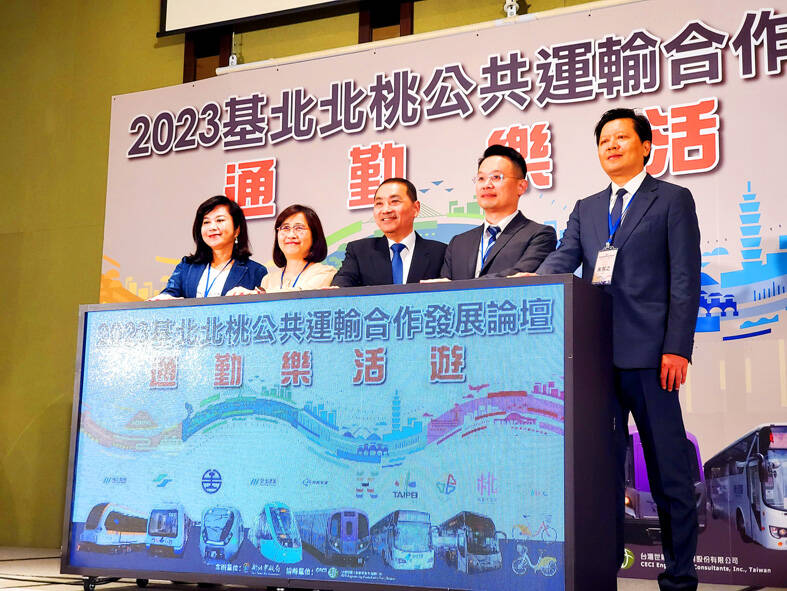New Taipei City Mayor Hou You-yi (侯友宜) yesterday called on the central government to earmark more funding to subsidize a NT$1,200 (US$39.16) monthly public transport pass program for commuters in Keelung, New Taipei City, Taipei and Taoyuan, which is set to begin in July.
The government’s plan to spend NT$20 billion over the next three years to subsidize regional transit pass projects across Taiwan is not enough, Hou told a regional public transport cooperation and development forum.
Keelung, New Taipei City, Taipei and Taoyuan occupy about 10 percent of the nation’s land, and have a total population of more than 10 million people, Hou said.

Photo: CNA
A similar program currently in place in Taipei and New Taipei City — the All Pass Ticket — requires NT$1 billion in subsidies per year.
The All Pass Ticket program allows EasyCard holders to buy a monthly pass for NT$1,280, granting unlimited access to public buses, shared bicycles, light rail, MRT metropolitan railway system and other public transport in Taipei and New Taipei City.
In July, a cheaper NT$1,200 travel pass — which would not only cover Taipei and New Taipei City, but also Keelung and Taoyuan — is set to be launched, allowing commuters to take the MRT, city and intercity buses, YouBikes, ferries and Taiwan Railways Administration trains as many times as they like, Hou said.
Given the number of people likely to take advantage of the new cheaper monthly pass, the three-year NT$20 billion budget planned by the government for the subsidies would not be sufficient, Hou said.

Taiwan is stepping up plans to create self-sufficient supply chains for combat drones and increase foreign orders from the US to counter China’s numerical superiority, a defense official said on Saturday. Commenting on condition of anonymity, the official said the nation’s armed forces are in agreement with US Admiral Samuel Paparo’s assessment that Taiwan’s military must be prepared to turn the nation’s waters into a “hellscape” for the Chinese People’s Liberation Army (PLA). Paparo, the commander of the US Indo-Pacific Command, reiterated the concept during a Congressional hearing in Washington on Wednesday. He first coined the term in a security conference last

Prosecutors today declined to say who was questioned regarding alleged forgery on petitions to recall Democratic Progressive Party (DPP) legislators, after Chinese-language media earlier reported that members of the Chinese Nationalist Party (KMT) Youth League were brought in for questioning. The Ministry of Justice Investigation Bureau confirmed that two people had been questioned, but did not disclose any further information about the ongoing investigation. KMT Youth League members Lee Hsiao-liang (李孝亮) and Liu Szu-yin (劉思吟) — who are leading the effort to recall DPP caucus chief executive Rosalia Wu (吳思瑤) and Legislator Wu Pei-yi (吳沛憶) — both posted on Facebook saying: “I

The Ministry of Economic Affairs has fined Taobao NT$1.2 million (US$36,912) for advertisements that exceed its approved business scope, requiring the Chinese e-commerce platform to make corrections in the first half of this year or its license may be revoked. Lawmakers have called for stricter enforcement of Chinese e-commerce platforms and measures to prevent China from laundering its goods through Taiwan in response to US President Donald Trump’s heavy tariffs on China. The Legislative Yuan’s Finance Committee met today to discuss policies to prevent China from dumping goods in Taiwan, inviting government agencies to report. Democratic Progressive Party Legislator Kuo Kuo-wen (郭國文) said

The Ministry of Economic Affairs has fined Taobao NT$1.2 million (US$36,900) for advertisements that exceeded its approved business scope and ordered the Chinese e-commerce platform to make corrections in the first half of this year or its license would be revoked. Lawmakers have called for stricter supervision of Chinese e-commerce platforms and more stringent measures to prevent China from laundering its goods through Taiwan as US President Donald Trump’s administration cracks down on origin laundering. The legislature’s Finance Committee yesterday met to discuss policies to prevent China from dumping goods in Taiwan, inviting government agencies to report on the matter. Democratic Progressive Party